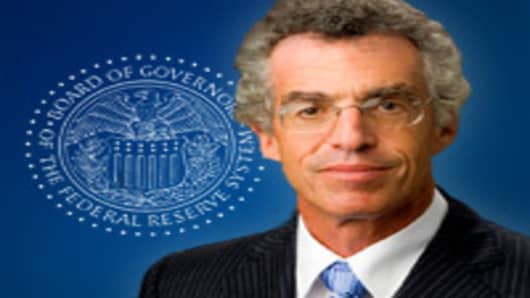The Federal Reserve can improve its communication and better anchor inflation expectations without losing policy flexibility by agreeing on a goal for price stability, a top Fed official said on Monday.
"I believe that the science of monetary policy indicates that the FOMC needs to go even further," Fed Governor Frederic Mishkin said, referring to the policy-setting Federal Open Market Committee, as he argued for greater communication.
"The FOMC should lengthen the horizons of its projections, reach a consensus on a specific numerical value for the mandate-consistent inflation rate, and indicate that this consensus value would be modified only for good scientific reasons," he told the Peterson Institute for International Economics in a speech.
Mishkin has announced his intention to step down from the Fed Board at the end of August to return to teaching at Columbia University in New York.
The Fed has debated the merits of adopting a numerical target for inflation. It stopped short of doing so, but Mishkin urged that it not abandon the project.
"Some commentators have worried that establishing a specific numerical inflation objective might lead to an overemphasis on controlling inflation and not enough concern about stabilizing real economic activity."
"My proposal is, however, consistent with the dual mandate, because it has the advantage of being less likely to be misinterpreted as a commitment to control inflation within a tight range over short horizons, since it only involves a consensus on the mandate-consistent inflation rate," he said.
The U.S. Congress has given the Fed a dual mandate to pursue price stability and maximum sustainable employment.
Mishkin said it was important for the consensus inflation goal to be based on headline inflation, not core inflation which strips out volatile energy and food prices, although he said core inflation also gave policy-makers important signals.
U.S. headline inflation has been pushed up sharply by soaring energy prices and Mishkin stressed it was beyond the power of Fed policy to do much about such short-term factors.
"Core tells you more about underlying inflation, and reacting too much to headline instead of reacting more to core could lead to bad outcomes," he said.
"Monetary policy should be responsible for what it can do, not what it can't do. A lot of short-run movements in headline inflation are completely out of the control of monetary policy ...the Federal Reserve does not control what goes on in the Middle East," he said.
Headline U.S. consumer prices rose 1.1 percent on a seasonally adjusted basis in June and are up 5 percent since June 2007. Energy prices have gained 24.7 percent on the year.
"The fact that the headline inflation is very high is a reflection of the fact that relative prices have to change," Mishkin said, who also welcomed the recent decline in oil prices.
To improve communication about its views on the economy, and hence about future likely policy action, the U.S. central bank has already begun publishing quarterly forecasts that include three-year projections.
Mishkin said that producing even longer time horizons would yield more constructive information about what policy-makers believe is the equilibrium level of inflation and employment in the U.S. economy.
"The three-year horizon of the projections may not be long enough to provide sufficient clarity about the views of FOMC participants regarding the mandate-consistent inflation rate, the sustainable growth rate of output, or the natural rate of unemployment," he said.


